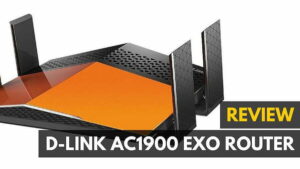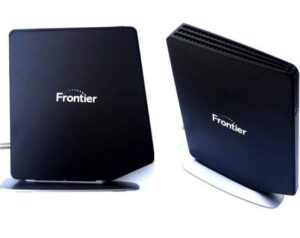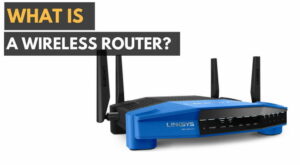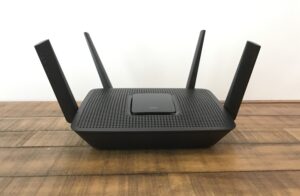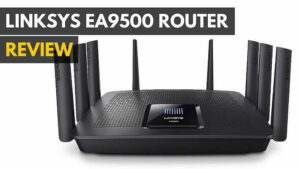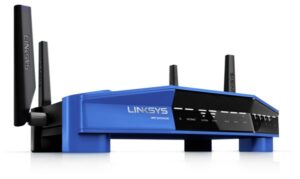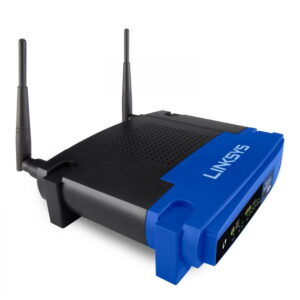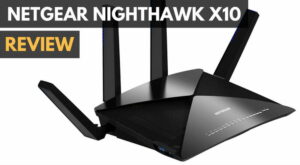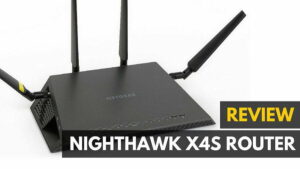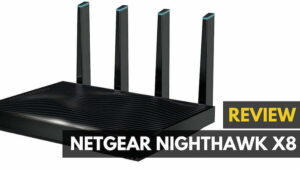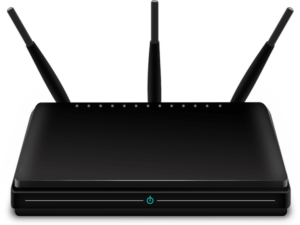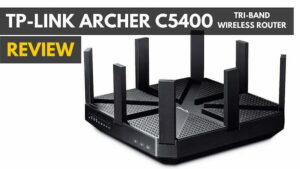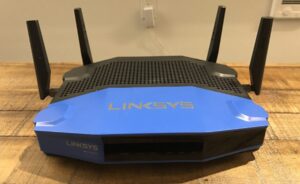Everything about what you see on the surface of the TP-Link Archer C9 wireless router would make you think it’s just another a mid-tier, run-of-the-mill consumer router that gets the job done and not much else; but oh how wrong you’d be. This might be a good time to read our best mesh routers list, or check out our review of the best router.
Keep reading my TP-Link Archer C9 review to find out what makes this router one of the best values on shelves today. If you’re with AT&T as your provider, you should also read our review of how customers of AT&T put at risk by new hack.
Overview
Summary: The Archer C9 doesn’t look like much, but performed way outside its paygrade on every test we threw its way.
Price: $119.95 on Amazon
Available: Now
Model: Archer C9
What We Liked
- Hands down the best speed-to-price ratio we’ve seen yet
- Software and iOS app were simple to navigate, rich in content
- Seriously, these speeds are out of control
What We Didn’t
- Standing design is more obnoxious than cool
TP-Link Archer C9 AC1900 Specs
| WiFi Type | 802.11ac |
| Processor | 1.0GHz dual-core processor |
| Operation Modes | Wireless Router, Access Point, Bridge |
| 128-bit Wireless Encryption | |
| 2.4Ghz | |
| 5Ghz | |
| MU-MIMO | |
| QoS | |
| USB Inputs | 1 USB 3.0, 1 USB 2.0 |
| Ports | 4 10/100/1000Mbps LAN Ports, 1 10/100/1000Mbps WAN Port |
| Price | $119.95 |
| Buy Now |
Design
If there were a word to describe the C9’s design: “routery” would probably be it. It’s the essence of what you think about when someone says the word router, with a flate-white shell contrasted against blue LED indicators, three standard antenna lining the top, and all the expected ports on the back.
Related: Also check out our TP Link Archer A7 review.
The C9 does find a way to “stand” out however, thanks to its included vertically-aligned kickstand. Unlike every other router we’ve reviewed, the C9 actually sits on its hind legs, tilting upwards at about a 75-degree angle so all the transmission and status lights can be seen from halfway across the room.

The design choice doesn’t pay off, however. Because of the router’s vertical orientation, in total darkness the bright blue LEDs point outward into your living room instead of straight up to the ceiling. This means they’re pretty much the only thing you can see when you dim the lights to watch a movie or play games, and the constant blinking quickly wore out its welcome to the point were we had to cover up the lights with a piece of white electrical tape just to give our eyes some rest.
Related: If you like this router, you might be interested in our TP Link AX6000 review.
Technically the C9 can be laid on its back, but then you’re barely left with enough space to plug an Ethernet cord in the back of the unit. It’s clear that the engineers at TP-Link wanted to do something different with the design of the C9, but in almost all actual-use cases the gamble just doesn’t pay off.
Software
Unlike Netgear or Linksys, TP-Link doesn’t have any special name for its router configuration dashboard – but that doesn’t make it any less special.
The key features of any respectable configuration dashboard are simplicity, tweakability, and how well the interface is laid out. The TP-Link C9 hits a checkmark on each one of those boxes, but doesn’t make a scene about it either.

On the surface the software is unassuming, and uncomplicated. Wireless settings, network mapping features, and parental controls are easy to find, easy to manage, and perfect for any level technology user in the house to catch on quick. The advanced settings were also plentiful however, allowing us to dive into more nerdy features like QOS management, setting up a media server, and configuring access ports for our wireless printer.
Read: Best Wireless Routers 2019
The TP-Link “Tether” app was also a welcome change with a clean, easy-to-understand interface and deep customization options if you’re logging in from the road. It’s not so intuitive that you would use it over a laptop or desktop from home, but still great if you’re on vacation but need to keep an eye on the parental controls while you’re gone.
Speed & Distance Tests
The TP-Link Archer C9 is $119.95. This is a price point where expectations aren’t high, and a router’s performance doesn’t necessarily have to be the absolute best of the best (given how much you spent on it). You plug it in and think “should be good for streaming and gaming, and that’s enough for me”, without expecting it to blow the doors off your devices anytime soon.

All this in mind, you can imagine our surprise when the speeds posted below started rolling in.
On the 2.4GHz network at a distance of 5ft, we were able to max out what the frequency can transmit (and then some): with 64.97Mbs download, and 96.35Mbps upload. The reliability of the 2.4GHz was a bit shoddier at 30ft, but only for uploads. Once we moved outside we actually noticed a gain in download speed at 67.18Mbps, but the upload dropped by nearly 2/3’s, to just 34.26Mbps up.

Somehow the 5GHz network downloaded faster than the wired connection, blowing away our expectations and the competition’s chances all in the same breath.

At a distance of 30ft the same reliability issues that plagued the 2.4GHz tests reappeared, but the dropoff wasn’t as immediately noticeable. At 30ft, the C9 posted a download rate of 181.40Mbps download/132.40Mbps upload.
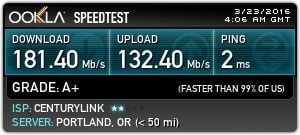
Switching over to the 5GHz spectrum bumped this figure up considerably. Again at a distance of 5ft, our Nighthawk X6 review showed an average download speed of nearly 210Mbps, with an upload speed of 280Mbps. At a distance of 30ft this number dropped off a bit to 170Mbps down/169Mbps up, but that’s to be expected on the 5Ghz spectrum, which can suffer more significant signal loss when transmitting through walls or doors.
The C9 even trounced its closest competition, the Netgear Nighthax X6, on the wired performance front.

When plugged directly into the source, the C9 pumped out a staggering 556.59Mbps download/416.66Mbps. Just as it was with the X6, this is still a long ways off from the 990Mbs down/897Mbps we get when piped directly into our fiber modem, but the router still shines bright under the fact that it’s still significantly cheaper and faster than the competition without breaking a sweat.
| All number in Mbps | 2.4GHz (5ft) | 2.4GHz(30ft) | 5GHz (5ft) | 5GHz (30ft) |
|---|---|---|---|---|
 Linksys EA8300 | Up: 31.75 Down: 150.97 | Up: 76.39 Down: 163.82 | Up: 281.26 Down: 502.53 | Up: 118.50 Down: 261.30 |
 | Up: 99.46 Down: 69.68 | Up: 5.45 Down: 9.96 | Up: 149.83 Down: 199.93 | Up: 9.07 Down: 12.95 |
 Netgear Nighthawk X10 | Up: 109.24 Down: 77.45 | Up: 69.30 Down: 69.67 | Up: 388.04 Down: 513.45 | Up: 351.29 Down: 354.44 |
 Linksys WRT3200ACM | Up: 102.65 Down: 73.26 | Up: 48.68 Down: 43.52 | Up: 475.24 Down: 449.84 | Up: 311.96 Down: 276.98 |
 AmpliFI HD Mesh Router | Up: 177.99 Down: 196.22 | Up: 197.23 Down: 146.29 | Up: 368.04 Down: 534.86 | Up: 161.06 Down: 372.34 |
 TP-LINK Archer C5400 | Up: 103.86 Down: 108.11 | Up: 61.92 Down: 84.31 | Up: 369.84 Down: 459.58 | Up: 231.07 Down: 269.54 |
 Linksys EA9500 AC5400 | Up: 106.49 Down: 94.73 | Up: 69.86 Down: 70.84 | Up: 295.30 Down: 302.3 | Up: 204.35 Down: 214.64 |
D-Link DIR-879 AC1900 EXO | Up: 102.05 Down: 81.34 | Up: 65.28 Down: 64.75 | Up: 241.46 Down: 338.53 | Up: 209.32 Down: 177.06 |
 Netgear Nighthawk X4S | Up: 77.45 Down: 109.24 | Up: 59.33 Down: 78.36 | Up: 241.70 Down: 348.86 | Up: 223.42 Down: 169.15 |
 Netgear Nighthawk X8 AC5300 | Up: 91.32 Down: 104.97 | Up: 71.61 Down: 82.20 | Up: 288.97 Down: 348.33 | Up: 216.49 Down: 200.58 |
 TP-Link Archer C9 AC1900 | Up: 64.94 Down: 96.35 | Up: 67.18 Down: 34.26 | Up: 289.97 Down: 483.37 | Up: 181.40 Down: 132.40 |
 Netgear NightHawk X6 AC3200 | Up: 59.19 Down: 84.98 | N/A | Up: 209.80 Down: 280.61 | Up: 170.98 Down: 169.84 |
 Linksys EA7500 AC1900 | N/A | Up: 44.27 Down: 141.55 | N/A | Up: 78.72 Down: 209.31 |
 TP-Link P5 AC1900 | Up: 90.89 Down: 99.21 | Up: 40.77 Down: 82.267 | Up: 354.28 Down: 524.54 | Up: 247.32 Down: 269.95 |
 Linksys WRT1900ACS | Up: 63.38 Down: 70.02 | Up: 59.37 Down: 56.66 | Up: 299.83 Down: 412.59 | Up: 242.43 Down: 216.16 |
 D-Link DIR890L/R AC3200 | Up: 49.25 Down: 66.30 | Up: 33.89 Down: 36.03 | Up: 285.83 Down: 470.85 | Up: 200.06 Down: 325.12 |
Wrap Up
The TP-Link Archer C9 router may look a little out of place when it’s shining its status light right in your face from a standing position, but that’s real easy to forget about once you see how this little box screams.
We’ve tested a lot of wireless routers here at Gadget Review. Some of the highest-end routers on shelves today have rolled through these doors, and almost all were able to post results that pushed our diagnostic laptop to its limits. The difference with the C9 is that none of those routers ever dipped below the $200 mark, let alone a measly $119.95.
The vertical design could use a re-work and there’s nothing eye-popping about the software. But for the amount you pay and the performance you get, the Archer C9 is unequivically the best router for your buck in 2016.
Related Articles:

![Best AC Router in [year] ([month] Reviews) 2 The best AC routers money can buy.||#2 Best AC Router|#4 Best AC Router|#1 Best AC Router|#3 Best AC Router|#5 Best AC Router|Best AC Router](https://www.gadgetreview.dev/wp-content/uploads/best-ac-router-300x169.jpg)
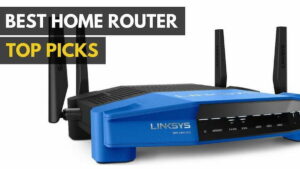
![Best Home WiFi in [year] ([month] Reviews) 4 The 7 Best Home Wi-Fi Systems](https://www.gadgetreview.dev/wp-content/uploads/the-7-best-home-wi-fi-systems-300x300.jpg)


![Best Router for Gaming in [year] 7 The top routers for gaming.|#1 Best Router for Gaming 2016||#1 Best Router for Gaming 2016||#2 Best Router for Gaming 2016|||#3 Best Gaming Router for 2016|#4 Best Gaming Router for 2016|#5 Best Gaming Router for 2016|Best Gaming Router For 2016|||||](https://www.gadgetreview.dev/wp-content/uploads/best-router-for-gaming-300x169.jpg)
